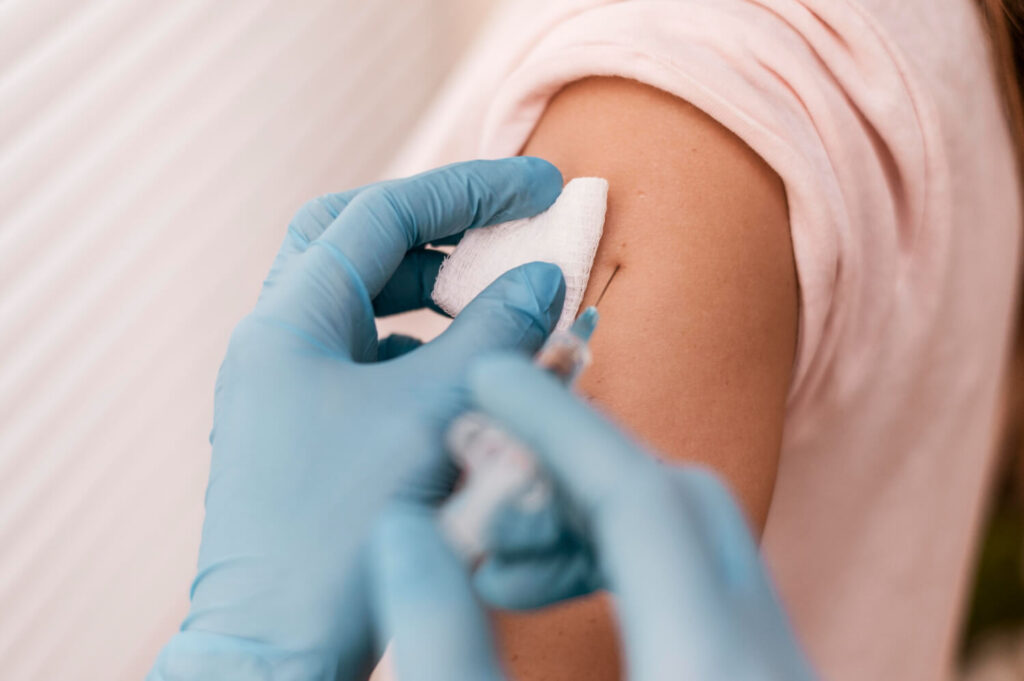As Monkeypox (Mpox) continues to pose a health threat globally, the World Health Organization has ramped up the need for vaccination efforts to curb the spread of the virus. Unfortunately, the Mpox vaccine known as the MVA-BN or JYNNEOS vaccine is not yet available in the Philippines as cases are deemed less severe. Despite that, it is still important to know the importance of vaccines, especially the Mpox vaccine side effects involved. Knowing this crucial info can help patients prepare once the vaccine is accessible.
Understanding the crucial details of the Mpox vaccine can help you to make informed health decisions. This article provides a comprehensive overview of the potential Mpox vaccine side effects and distinguishes the common and rare reactions. Let’s begin!
JYNNEOS Vaccine: Mpox Vaccine and Its Safety

The Mpox vaccine, JYNNEOS vaccine, is approved by the FDA, making it safe for immunization purposes. It is designed to prevent infection from the Monkeypox virus, a zoonotic disease that can cause significant illness in humans. JYNNEOS vaccine is also an approved smallpox vaccine as both the Mpox virus and smallpox virus originated from the same family of viruses known as the variola virus. Please note that the vaccine is recommended for people 18 years of age and older, and those considered to be at high risk of contracting the disease.
This vaccine works by stimulating the immune system to recognize and fight the virus, thereby reducing the likelihood of severe disease and transmission. Extensive clinical trials and post-marketing surveillance have established that the Mpox vaccine is generally safe for most individuals. However, like all vaccines, it may cause side effects, which are typically mild and temporary.
Recommended Dosage and Schedule

The recommended dosage for the JYNNEOS vaccine, also known as the Mpox vaccine, typically involves two doses, of which the second dose is given after four weeks. JYNNEOS vaccine will comprise 0.5 mL per dose, encased in a single vial for the drug administration. This dosing schedule is crucial in ensuring optimal immune response and protection against the Monkeypox virus.
It is important for individuals to follow the recommended dosage and schedule provided by healthcare professionals to maximize the effectiveness of the vaccine. Adhering to the prescribed regimen can significantly reduce the risk of infection and potential complications associated with Monkeypox.
Common Mpox Vaccine Side Effects

While vaccines can help eradicate the health threat from the virus, side effects can still happen. Cases can involve allergic reactions, swelling, and other side effects, but are mostly identified as mild reactions from getting vaccinated. These reactions are generally a sign that the body is building protection against the Mpox virus.
The most common side effects include:
- Injection Site Reactions: Pain, redness, and swelling at the Mpox vaccine site of injection are the most frequently reported side effects. These symptoms typically subside within a few days without requiring medical intervention.
- Systemic Reactions: Some people may experience general feelings of discomfort such as fever, fatigue, headache, and muscle aches. These symptoms are usually short-lived and resolve on their own as the body mounts an immune response.
- Localized Swelling: In addition to redness and pain, slight swelling near the injection site may occur. This is a normal response and typically diminishes within a couple of days.
Rare but Serious Adverse Events
On the other hand, Mpox vaccine side effects can also involve rare but severe cases that warrant attention. These severe reactions can occur in individuals with specific health conditions or allergies.
Serious Mpox vaccine side effects include:
- Allergic Reactions: Severe allergic reactions, though extremely rare, can occur. Symptoms may include difficulty breathing, swelling of the face and throat, rapid heartbeat, and dizziness. Anaphylaxis, a life-threatening allergic reaction, requires immediate medical attention.
- Neurological Effects: There have been isolated reports of neurological side effects such as seizures and encephalitis. These cases are rare and typically associated with underlying health issues.
- Autoimmune Responses: In exceedingly rare cases, the vaccine might trigger autoimmune reactions, where the immune system mistakenly attacks the body’s tissues. Continuous monitoring and research help in identifying and mitigating these risks.
The likelihood of experiencing these serious side effects is significantly low, especially when compared to the benefits of immunization. It is essential to consult with a healthcare provider if you have a history of severe allergies or autoimmune conditions before receiving the vaccine.
Frequently Asked Questions
Is the Mpox vaccine safe for pregnant people?
The safety of the Mpox vaccine for pregnant individuals is a crucial concern. Extensive research and clinical trials are ongoing to determine its efficacy and safety profile in pregnant women. Consult with your healthcare provider for personalized guidance.
How long will the Mpox vaccine side effects last?
Mpox vaccine side effects typically subside within a few days. However, in rare cases, severe reactions may occur, necessitating immediate medical attention. Continuous monitoring and reporting of any adverse events play a vital role in ensuring vaccine safety.
How to know if I am allergic to the Mpox vaccine?
Common signs of an allergic reaction to the Mpox vaccine include hives, swelling, difficulty breathing, and rapid heartbeat. If you experience any of these symptoms or other unusual reactions after vaccination, seek immediate medical help. Early intervention is essential in managing vaccine-related allergies effectively.
Conclusion
While vaccines are generally a safe and effective tool, being informed about potential Mpox vaccine side effects empowers individuals to make educated health decisions. As the threat of Mpox persists, embracing vaccination alongside vigilant monitoring and proactive health practices will significantly contribute to the nation’s defense against this infectious disease.
Stay informed, consult with medical experts, and take proactive steps to protect yourself and your loved ones from Mpox today.



